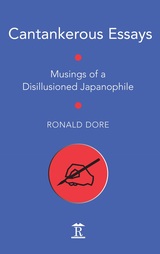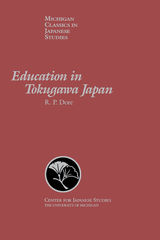2 books by Dore, R.

Cantankerous Essays
Musings of a Disillusioned Japanophile
Ronald Dore
Amsterdam University Press, 2015
Prompted by increasing evidence of the world’s shift to the right, not least among the industrialised nations, here is a cri de coeur from almost the last survivor from the post-war crop of European sociologists and scholars of Japanese Studies. After six decades following developments in Japanese society, economy and culture and as a well-known ‘leftie’ – he describes the evolution of his cognitive and evaluative/emotional perceptions of Japan, and explains why he can no longer be described as a Japanophile. To which are added essays on more general issues of the day, such as events in the Ukraine, Iran and Israel. The key words are indeed ‘cantankerous’ (because he is greatly exercised by the ‘conspiracies of silence’ embedded in the culture of modern political and public life); ‘musings’ (because this is not so much a single-focus monograph, rather a collection of spontaneous, but deeply-considered reflections on matters of the moment) and ‘disillusioned’ (both by Japan’s reversion to chauvinistic nationalism, and because, as a youth, he hoped for and expected an enhancement of the role of reason in international affairs.) This will be of special interest to all who know or have accessed the author’s vast literary output relating to Japan; but it also has considerably wider relevance among those who are in any way connected with contemporary society, politics and economics and wish to confront the ‘conspiracy of silence’ within our interdependent world.
[more]

Education in Tokugawa Japan
R. P. Dore
University of Michigan Press, 1992
“This careful and important study of the development of the varied types of education in the last two and a half centuries of feudalism in Japan under the Tokugawa dictatorship (1600–1868) is more than a history of premodern education. It is also an intellectual history and a history of the educational philosophy of the writers of that period. Basing his work on extensive Japanese primary sources, the author has selected and organized his material well; thus his study fills an important gap in our knowledge of Japanese history.” —Hugh Borton, Haverford College, American Historical Review 71, no. 4 (July 1966): 1410–11.
“There is no other book like it. . . . Readers already familiar with earlier books by Ronald Dore will rightly have guessed that we have been given yet another tour de force. Utilizing a remarkable amount of primary source material and discussing its implications with his customary grace and clarity, the author deals with the educational institutions for both samurai and commoner and the curricula of the bewildering variety of schools of Japan from the beginning of the 17th century through the Meiji Restoration in 1868. Yet this is in no sense a book of restricted interest, for it has as much to say to the student of sociocultural change as to the Japan specialist.” —R. J. Smith, Cornell University, American Anthropologist 68, no. 4 (August 1966), 1086–87.
[more]
READERS
Browse our collection.
PUBLISHERS
See BiblioVault's publisher services.
STUDENT SERVICES
Files for college accessibility offices.
UChicago Accessibility Resources
home | accessibility | search | about | contact us
BiblioVault ® 2001 - 2024
The University of Chicago Press









